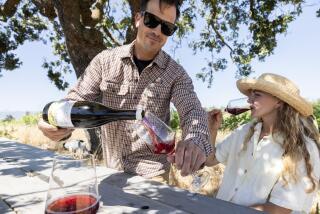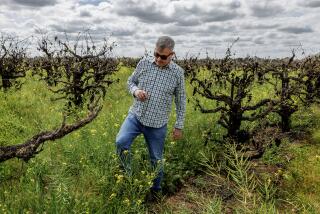Teetotalers Upset : Wineries Dig In Despite Foes at Adventist College
- Share via
ANGWIN, Calif. — The teetotalers at a Seventh-day Adventist college nestled among the evergreens on Howell Mountain are trying to adjust to their new neighbors--two wineries that have cleared trees to plant grapes.
One winery is planning its first bottling after the Adventists’ attempt to stop it ended in what Pacific Union College Vice President Herbert Ford called “abysmal defeat.”
The other is planting grapes as Ford and others mull whether to mount a last-ditch effort to protect their mountaintop sanctuary.
‘Got Enough Wineries’
“It would appear to us that we’ve got enough wineries and vineyards to let everybody get all the wine they would want,” Ford said. “Why do we really have to sacrifice a beautiful mountaintop?”
Because, wine makers say, the rolling mountaintop’s soil is even better for grapes than land below in the wine-rich Napa Valley.
Besides, Woltner Estates wine maker Ted Lemon said, “It’s a free country. It’s important that people be allowed to do what they want to and you have to work out a compromise.”
For now, the compromise is a jittery truce, with both sides working toward a peaceful coexistence.
“We want to be friends with everybody,” Ford said. “We don’t think there are any bad people, just good people with bad ideas.”
Pacific Union College shared the mountaintop with wineries for more than 40 years before economic pressures killed the wineries in the 1950s. Forest overtook the land that once had borne grapes.
Dominated by College
Over the years, the one-time resort became dominated by the 1,400-student college. Today, Ford said, more than 75% of Angwin’s 3,000 residents are Adventist. Virtually all the town’s businesses are owned by the college or church members.
Adventists observe the Sabbath on Saturdays and have strict rules against use of alcohol, tobacco and caffeine. Students who violate the school’s ban on such items can face suspension.
But Ford and other local Adventist officials insist it is the school’s natural setting, not the temptation of alcohol, that concerns them.
“We don’t see the start of a winery as any greater threat than the liquor store in St. Helena (eight miles away),” Ford said.
In June, the Adventists petitioned the Napa County Board of Supervisors to stop wine production by Woltner Estates, a French-owned firm that had planted a new vineyard on the site of a 100-year-old winery that had fallen into disuse in the 1950s. The supervisors unanimously supported the winery.
The petitions addressed forest destruction, fears that the winery would sap the area’s meager water supply and cause erosion and worries about tourists creating traffic hazards.
Response to Critics
But, Lemon said, Woltner Estates will not admit the public for tasting or tours. The vineyard’s water comes from its own rain-catching reservoir, he said, not from underground supplies. Grass has been planted between rows of vines to prevent erosion, he said.
“We have the feeling we were misunderstood,” he said, adding that a larger winery could have caused more problems for residents.
More to Read
Sign up for Essential California
The most important California stories and recommendations in your inbox every morning.
You may occasionally receive promotional content from the Los Angeles Times.










